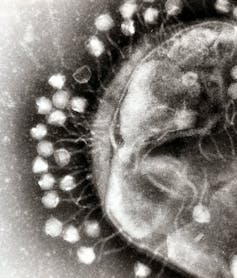
Western Province Governor Hon. Toboi Awi Yoto receives his COVID-19 vaccination (Credit: Tess Keam)
Burnet Institute epidemiologist Dr Stefanie Vaccher writes for Nine Media publications including on the urgent need to support vaccination programs in Papua New Guinea.
In South Africa, only one in four people are vaccinated against COVID-19, a key factor behind the spread of the Omicron variant. But just four kilometres north of Australia, the situation is far more dire. In Papua New Guinea, our closest neighbour, fewer than one in 20 have had the jab.
High rates of infection and low vaccination coverage significantly increase the risk of COVID-19 not only spreading, but mutating. Combined with high rates of HIV and multi-drug resistant tuberculosis, also seen in South Africa, the risk of a dangerous new coronavirus variant emerging on Australia’s doorstep becomes very real.
As the world races to understand the , PNG is still reeling from the , causing record numbers of cases and deaths. Despite this, remain some of the lowest in the world.
Inadequate community awareness has led to widespread vaccine hesitancy in both urban and remote areas, spurred on by confusion about who can be vaccinated, where, and with what vaccine.
PNG’s COVID-19 vaccine rollout has been severely hampered by misinformation and fear, compounded by practical and logistical issues. Across the country, conspiracy theories spread by word-of-mouth and WhatsApp at immense speed. Even healthcare workers are not immune.
Unvaccinated workers discourage others from being vaccinated, while those promoting vaccination have been physically attacked in several provinces. Many with fervently held religious beliefs have also incited stigma and discrimination, preventing people from being tested for COVID-19, let alone being vaccinated.In such a climate of suspicion and distrust, Australia cannot simply send vaccines to PNG and expect to see a dramatic increase in vaccination rates.
After early concerns about AstraZeneca because of inaccurate reporting by Australian and international media, PNG has now received donations of the Johnson & Johnson and Sinopharm vaccines. If people are to be persuaded to roll up their sleeves, it’s vital they receive credible information about each new option, hence the need for tailored community education campaigns, ideally in many of the 800-plus languages spoken around the country.
Effective public health interventions require meeting people where they are: working with varied levels of understanding and acceptance, and physically visiting people in their communities. It means empowering and educating local leaders and supporting them to shape discussions with their constituents.
The initiative is calling for the Australian government to invest $50 million to address COVID-19 vaccine hesitancy. In PNG, there’s an urgent need for a large-scale behavioural change campaign to convince people of the importance of COVID-19 vaccination. Changing minds is particularly challenging when you consider that PNG has no routine adult vaccination programs and some of the lowest childhood vaccination rates in the world.
A co-ordinated and sustained response is needed. Strategies which are currently under-utilised but effective include joining forces with local vaccine champions – doctors, sports stars, or community leaders – to share personal stories about people who have had COVID-19 or been vaccinated; or church leaders using scripture to encourage congregations to get vaccinated.
Western Province, bordering Indonesia and Australia, has the highest COVID-19 vaccination rates outside of Port Moresby thanks to strong partnerships between government, churches, local leaders, and international organisations, and ongoing community engagement. Additionally, visits to remote and hard-to-reach villages for vaccine awareness and immunisations have been pivotal in helping overcome fears.
Similar successes have been seen across the Pacific. Samoa has applied strategies learnt from its 2019 measles outbreak to boost COVID-19 vaccination rates. Following an intense community messaging and awareness campaign, local teams went door-to-door across the country and increased first-dose vaccination rates by 12 per cent in a single weekend. In Fiji, a team of healthcare workers hiked for five hours to vaccinate a village with just 60 people. Every vaccination counts.
Mass vaccination campaigns are resource intensive. If the international community wants to increase COVID-19 vaccinations in PNG, they must build relationships and work with trusted local organisations. Initiatives such as providing fuel for healthcare teams to conduct vaccine outreach, or small incentives like snacks or t-shirts post-vaccination can go a long way in supporting widespread vaccine rollout.
The lack of testing and absence of a national death registry makes it impossible to measure the true toll of COVID-19 in PNG. Yet, despite recent reports of oxygen shortages and overflowing morgues, the majority of the Papua New Guineans remain unconcerned and do not plan to get vaccinated.
Every additional day with lagging vaccination rates leads to preventable deaths. Omicron is a clarion call for Australia to do much, much more to help vaccinate the people of PNG.
.








